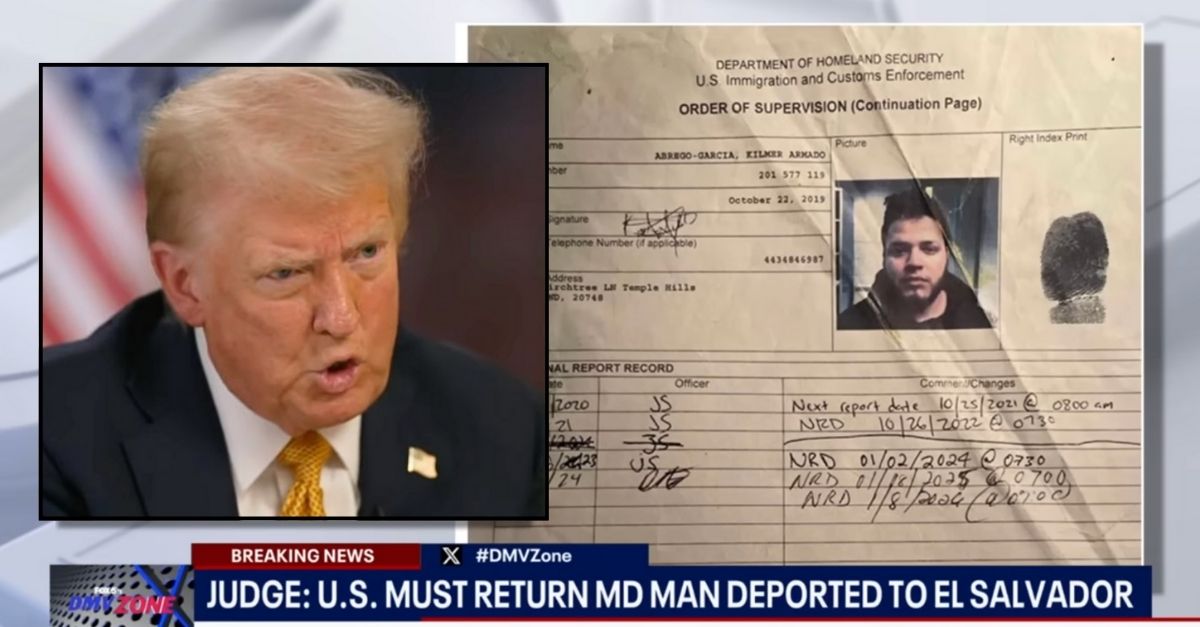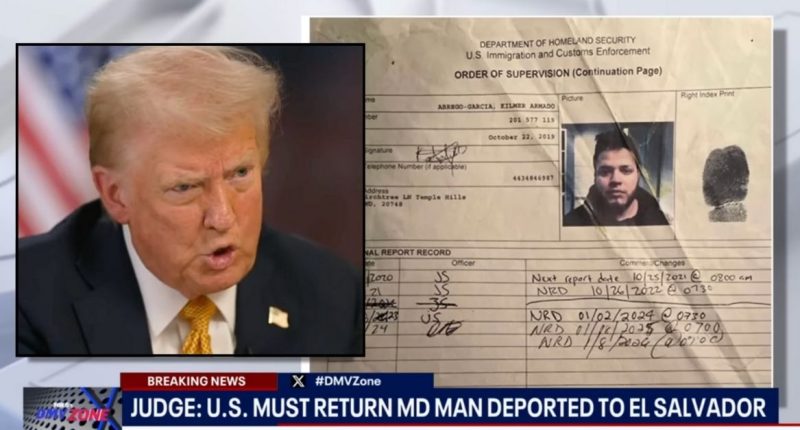
Inset: President-elect Donald Trump on “Meet the Press” Sunday, Dec. 8, 2024 (NBC News/YouTube). Background: Immigration records for Kilmar Abrego Garcia (WTTG/YouTube).
Lawyers for Kilmar Abrego Garcia — who was mistakenly shipped off to El Salvador as part of President Donald Trump’s deportations under an 18th-century wartime authority — have fired back at the Justice Department over its claim that the Salvadoran government “may have its own compelling reasons to detain” the Maryland father that bar the U.S. from bringing him back.
“It points to no evidence — only pure conjecture about El Salvador’s general views on criminal enforcement,” wrote Abrego Garcia’s legal team in a Wednesday response to claims made by DOJ lawyers in a U.S. Supreme Court filing.
Chief Justice John Roberts on Monday afternoon temporarily halted a preliminary injunction issued by U.S. District Judge Paula Xinis, which gave the DOJ just over three days to facilitate bringing Abrego Garcia back to the country, referring to his deportation as “an illegal act” in her order. The 29-year-old was sent to El Salvador on March 15 in error as part of Trump’s proclamation invoking the Alien Enemies Act of 1798 to rush through mass deportations, which have since been blocked by a federal judge, without providing due process to those being flown out of the country.
Abrego Garcia, a native of El Salvador, was in the U.S. with protected legal status at the time of his deportation. His wife and 5-year-old child are both U.S. citizens.
Asserting that the administration was likely to win on the merits of the case, the Justice Department argued in a Monday filing that Xinis’ order demanding the return of Abrego Garcia “from a foreign sovereign” violates Article II of the U.S. Constitution. The DOJ urged the nation’s highest court to block Abrego Garcia’s return and cited El Salvador’s “own compelling reasons” for possibly wanting to keep him, as well as its “own legal rationales for detaining members of … foreign terrorist groups like MS-13.”
The government has proffered “no actual evidence,” however, that Abrego Garcia was actually a gang member, according to his lawyers. He has no criminal record in the U.S. or El Salvador and has submitted sworn statements that he was fleeing El Salvador due to gang violence, per his lawyers.
“These vague speculations are forfeited because they were never previously asserted and, in any event, devoid of factual support,” Abrego Garcia’s attorneys said Wednesday. “The only evidence is that he has never been charged or convicted of a crime in any country. And, of course, Abrego Garcia has not even lived in El Salvador since 2011 — some 14 years ago — when he was 16 years old, rendering the Government’s claim implausible.”
The attorneys added, “If the Government has evidence as to Abrego Garcia, it should say so. It refuses.”
More from Law&Crime: ‘Bad all around’: Trump admin’s top DC prosecutor says charging of Jan. 6 rioters is DOJ’s ‘greatest failure’ since Japanese American internment camps
Adding what they believe was ultimately more fuel for their case, Abrego Garcia’s attorneys noted how a DOJ attorney last week conceded in court that Abrego Garcia’s deportation was due to an “administrative error” and said the government “made a choice here to produce no evidence,” which they argue “speaks for itself.”
Erez Reuveni, the acting deputy director for the Office of Immigration Litigation and a 15-year veteran of the DOJ, was reportedly told by DOJ brass that he’d be placed on paid leave indefinitely for the comments he made during a court hearing before Judge Xinis.
“The facts are conceded,” Reuveni confessed during the hearing. “Mr. Abrego Garcia should not have been removed.”
According to the DOJ, Reuveni was temporarily shelved after the proceeding for failing to “follow a directive” from his superiors. Abrego Garcia’s lawyers said Wednesday that they believed the DOJ was trying to distance itself from Reuveni’s statements because it knows that they were both true and damaging to their case.
“The Government’s Reply takes the extreme step of disavowing its own lawyer’s statements,” the attorneys said. “And perhaps, for the first time in any Government brief to this Court, the Government impugns its own counsel, whose candor the district court commended, for making admissions that purportedly ‘did not and do not reflect the position of the United States.’ But the Government, like any litigant, cannot disavow the concessions of its own counsel — especially when it does not even contend that anything about them is factually untrue.”
Abrego Garcia’s lawyers said that “courts would cease to function” if they could no longer rely on concessions by counsel at oral argument. “There is no basis for the Government to withdraw the good-faith admissions of its experienced agent simply because it now finds them inconvenient,” they argued.
In the end, Abrego Garcia’s legal team believes it is the government’s duty to comply with judicial orders and to bring the Maryland father home after mistakenly sending him to a country where he doesn’t belong. Their fear is that the Trump administration will find a way to avoid this without taking the necessary procedures required to do so.
“To the extent returning Abrego Garcia from a U.S.-contracted facility regularly visited by U.S. officials proves impossible, or requires the Presidential diplomacy the Government suggests, the Government may present those facts to the district court,” the lawyers said. “That would allow the factual record of the Government’s efforts to carry out the court’s order, and any actual impediments thereto, to be probed and challenged as part of the ordinary adversary process. But the Government cannot have license to evade a court order based on hypothetical obstacles that are nothing more than a figment of its imagination.”
Love true crime? Sign up for our newsletter, The Law&Crime Docket, to get the latest real-life crime stories delivered right to your inbox.







